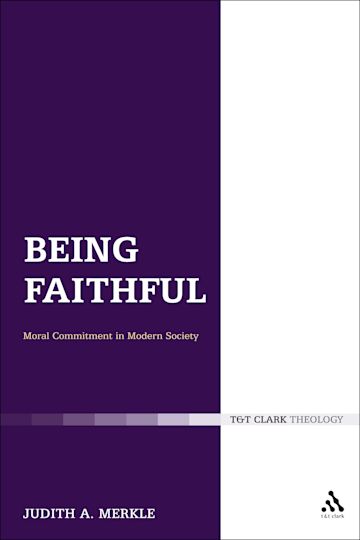You must sign in to add this item to your wishlist. Please sign in or create an account
This book explores how the Christian life is lived in a pluralistic situation where different contexts of belonging give rise to different moral challenges. While it is characteristic of modern life to exist in a postmodern situation where there is an erosion of comprehensive systems of meaning, we still live today in contexts of belonging. We still seek to gather out of the fragments of modern life the sustenance of a network of belonging, belief and practice which comprise a faithful life. The construction of such a life, not only for us, but for others, serves as the framework for our moral commitments. Furthermore, sustaining and transforming social frameworks which shape various aspects of human life form the life task of adult Christians.
| Published | Sep 02 2010 |
|---|---|
| Format | Ebook (PDF) |
| Edition | 1st |
| Extent | 208 |
| ISBN | 9780567611505 |
| Imprint | T&T Clark |
| Series | Ecclesiological Investigations |
| Publisher | Bloomsbury Publishing |
'Many Catholics today are alienated from the Church, yet feel their identity is tied up with it. They are conscious that their world has changed radically; and so have they. They want to be faithful disciples and know they cannot do that alone. Merkle helps readers to wrestle with their personal and Christian identity in this new context. Using the anthropological insights of Mary Douglas and others, she explores the many-layered and sometimes conflicting dimensions of the personal, social, cultural and ecclesial contexts in which Christians have to be faithful disciples today. The wide vistas she opens out have profound implications for spirituality as well as for moral theology. Being faithful involves saying a firm; to whatever is perceived as inhuman in order to express a fuller; to the many positive dimensions of our secularised world. Merkle takes moral theology a million miles from its earlier incarnation of helping confessors assess the gravity of particular sins. She offers a path to healing the earlier divorce between moral and spiritual theology. This book is as relevant reading for a retreat as it is for a course in moral theology and social ethics. Catholic laity are often referred to as "the faithful". Merkle examines in depth the meaning of "being faithful" intoday's world. It involves an awareness of and involvement with the whole multiplicity of contexts in which we live out our lives in today's world. Living out of context makes us displaced persons, feeling lost in midst of our globalised world. Merkle invites us to conversion (being in love) at personal, community, ecclesial and sociallevel. Like all loving, there is a self-emptying of false identity to make room for the fullness of living community. The Catholic route to this is through mediation, sacramental life and communion. This book offers intoxicating reading. It makes accessible the fruits of Merkle's wide-ranging reading, made all the more valuable by the way she draws it all together into a coherent whole. Her expertise developed through long years of teaching experience adds to the rich mix, while her own faith commitment is unobtrusive but all-pervading. A book which demands sustained attention from the reader but in return offers a profound understanding of the meaning of being faithful in our exciting but confusing 21st century world.' Kevin T. Kelly, Emeritus Research Fellow, Liverpool University UK
Kevin T. Kelly
Building on the best theological, ethical, and social-scientific sources, Dr. Judith Merkle has created a balanced and insightful method for addressing contemporary challenges in three dimensions: the personal, ecclesial, and global. The [book] focuses on the virtue of faithfulness in which Christians respond daily to follow Jesus, a calling that impels them to engage in social transformation. The author identifies a pervasive secularity in today's world that challenges the religious belief of individuals, nations, the Church, and moral theology. Other challenges include nuclear war with its links to terrorism, the trafficking of human beings, and the threat of ecological disaster. She delicately balances the treatment of important concepts; for example, being faithful and loving to God and neighbor (who is faithful), and being faithful by resisting evil and building just and peaceful structures that enhance the "human" (the "object" to which one is faithful). She presents balanced treatments of both grace and sin; personal sin and social sin; and individual conscience and social analysis. The highlight of this book is the author's skilled development of how diverse cultures form the contexts in which moral decisions, ideologies, and public policy are made. Borrowing the four-fold cultural typology from anthropologist Mary Douglas, Merkle interprets how each of the four types has historically shaped the contours of the Church and in doing so has shaped its mission. Her work is a major contribution to Christian social ethics.' - Thomas L. Schubeck, S.J., John Carroll University, USA
Thomas L. Schubeck, S.J.
... the strength [of this text] lies within Merkle's interpretation of society as an ever changing amalgam into which the believing Christian is called to faithfulness... Consequently, the work provides an interesting pattern for social ethics in which the church continues to remain opposed to dominant cultural norms whilst in the midst of society and transforming it from the inside out.
Theological Book Review, Volume 23, No.2
Free US delivery on orders $35 or over
Your School account is not valid for the United States site. You have been logged out of your account.
You are on the United States site. Would you like to go to the United Kingdom site?
Error message.

